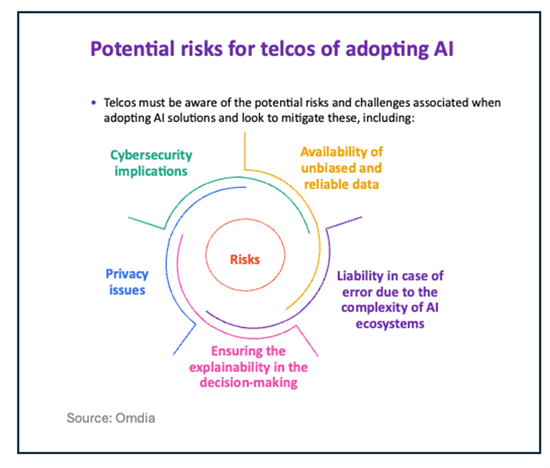Analysis from Omdia’s latest report Regulatory Risks and Challenges of Adopting Artificial Intelligence (AI) in the Telecoms Sector has highlighted key regulatory considerations telcos must address when adopting AI solutions. The report outlines critical areas such as rules surrounding high risk situations and prohibited use, as well as transparency requirements, and enforcement.
“While the use of AI creates many benefits such as improved customer service, optimized network operations, detecting new business opportunities, cost savings, and process automation, there are also numerous risks and challenges to be aware of”, said Sarah McBride, Principal Analyst, Regulation, at Omdia. Risks include availability of unbiased and reliable data, liability in case of error, lack of trust in decision making, privacy and security.

AI technology is rapidly being integrated into a wide range of use cases across a variety of industries, with the telecom sector being a key industry. Although most AI systems in telecoms are still under development, AI is poised to play a significant role in the sector in the mid-term, presenting numerous opportunities for innovation. Therefore, it is essential that telcos are aware of the potential regulatory risks and challenges associated with AI adoption.
“There has been a surge of activity in the AI space, particularly around potential regulation, and this trend is likely to continue”, McBride said. “As a result, it would be prudent for telcos to proactively implement a risk management framework within their systems before AI implementation, ensuring adherence to standards of data quality, accuracy, robustness, and non-discrimination. Equally important is the adoption of an ethical, human-centric and trustworthy approach to AI. As key enablers of AI technology, it is crucial for the telecoms sector to drive ethical and responsible AI technology.”
As AI encompasses a broad variety of concepts and technologies that are embedded in all aspects of a telco’s business, they will need to adhere to different guidelines depending on the context and application of AI. Existing regulatory tools in the EU such as the Data Act, the Digital Markets Act, and the AI Act all impact the developing AI technology landscape. as well as existing regulations not specifically targeting AI such as the European Electronic Communications Code, net neutrality, data protection and privacy regulations.
AI requires large amounts of data sets making adherence to data protection, security and privacy, a crucial concern for telcos. AI technologies that pose risks to health, safety or rights particularly those involving biometric information, network security or critical infrastructure are subject to heightened scrutiny. “Telcos must ensure they fulfill regulatory requirements for these high-risk situations such as transparency, human oversight and data governance by completing risk assessments and implementing governance frameworks”, said McBride. Additionally, key aspects of regulation such as monitoring and reporting obligations also apply to telcos. Transparency is central to building trust in AI especially when it is used in customer service. Telcos need to be aware that many regulatory frameworks mandate that customers receive clear information regarding the use of AI including any limitations of the technology.



